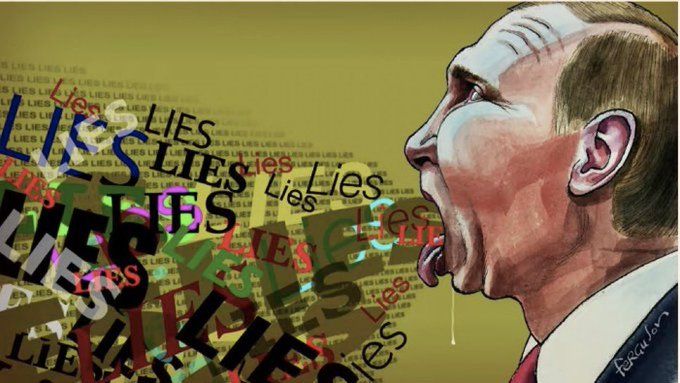"Here are the new American sanctions. Soon, there will be new European ones too. Should we react to them? It seems unnecessary, as there are already tens of thousands of them. We have learned to live and develop despite them."
1. Appeal to Tradition (Argumentum ad Antiquitatem):
Suggesting that since Russia has managed to live and develop despite previous sanctions, there is no need to react to new ones.
2. Hasty Generalization:
Claiming that there are "tens of thousands" of sanctions without providing specific evidence or context.
"On the other hand, we must react. Not only the authorities and the state but all our people in general. Everyone who loves our Motherland – Russia. Because they – the USA and their damn allies – have declared a war without rules on us!"
1. Appeal to Nationalism:
Calling on everyone who loves Russia to react, appealing to patriotic sentiments.
2. Ad Hominem:
Using derogatory language like "their damn allies" to attack the opponents rather than their actions or policies.
3. False Dilemma:
Presenting the situation as a binary choice between inaction and a total national response.
"How should we react? I have mentioned this before, but it is worth repeating. We must try every day to inflict maximum harm on the countries that have imposed these restrictions on our country and all our citizens. Harm in every possible way. Harm to their economies, their institutions, and their rulers. Harm to the well-being of their citizens. Harm to their confidence in the future. For this, we must continue to find critical vulnerabilities in their economies and strike at them in all areas. Cause damage in all places, paralyzing the work of their companies and government institutions. Identify problems in their key technologies and ruthlessly attack them. Literally destroy their energy, industry, transport, banking, and social services. Instill fear of an imminent collapse of all critical infrastructure."
1. Argumentum in terrorem:
Using fear as a motivator, suggesting that instilling fear of collapse is a valid strategy.
2. Overgeneralization:
Broadly stating that all aspects of the enemy’s society should be harmed without distinction.
3. Begging the Question (Circular Reasoning):
Assuming that inflicting harm is justified without providing a rationale beyond the existence of sanctions.
"Are they afraid of us transferring our weapons to the enemies of the Western world? We should transfer all possible types of weapons to them, except nuclear (for now)! Are they afraid of anarchy and a surge in crime in major cities? We should help in the disorganization of their municipal government! Do they fear war in space? Then they will get it. Let everything stop, everything break down, everything fall apart for them! Are they afraid of social explosions? Let's create them! We need to flood their media sphere with all their most sinister nighttime fears, using all their terrible phantom pains. We should no longer spare their psyche! Let them tremble in their cozy homes, let them shake under their blankets. Do they scream about our use of fake news? Let's turn their lives into one continuous mad nightmare, where they can't distinguish wild fiction from the realities of the day, infernal evil from the routine of life."
1. Argumentum in terrorem:
Threatening various catastrophic outcomes, such as anarchy, war, and social collapse, to manipulate reactions.
2. Slippery Slope:
Suggesting that transferring weapons and causing disorder will inevitably lead to the complete breakdown of Western societies.
3. False Cause (Post Hoc Ergo Propter Hoc):
Assuming that actions like media manipulation will directly cause societal collapse without sufficient evidence.
4. Red Herring:
Distracting from the actual issue of sanctions by proposing extreme and unrelated retaliatory measures.
"And no rules regarding the enemy! Let them get everything they deserve for harming Russia, and as painfully as possible! Everyone can contribute!"
1. Appeal to Vengeance:
Advocating for retaliation purely based on a desire for revenge.
2. Moral Equivalence:
Suggesting that any form of retaliation is justified because of the perceived harm, without considering proportionality or ethics.
"Remember: Quid pro quo! Tit for tat! Fracture for fracture, eye for eye, tooth for tooth; as he has done <...>, so it shall be done to him (Leviticus 24:20).”
1. Appeal to Tradition:
Using a Biblical reference to justify retaliation, appealing to ancient texts as a rationale.
2. False Equivalence:
Equating the complex geopolitical actions and consequences with simple, direct retributive justice.
Medvedev's speech heavily relies on emotional appeals, particularly nationalism and fear. He calls on all Russians to unite against the perceived aggression from Western countries, framing the situation as a war without rules. This kind of rhetoric aims to rally domestic support by invoking a sense of national pride and urgency.
Logical Fallacies
The speech contains numerous logical fallacies:
- Argumentum in terrorem: Medvedev frequently employs fearmongering, suggesting catastrophic outcomes for Western societies as a form of retaliation.
- Ad Hominem Attacks: He uses derogatory language against Western nations and their allies, aiming to discredit them rather than address their policies.
- False Dilemma: He presents the situation as a binary choice between inaction and total retaliation, ignoring other possible responses.
- Slippery Slope: Medvedev implies that various extreme actions will inevitably lead to the collapse of Western societies without substantiating these claims.
- Appeal to Tradition: By referencing ancient texts like the Bible, he attempts to justify retaliatory actions through historical precedent rather than contemporary reasoning.
Reaction to Sanctions
Medvedev’s anticipation of a stock market collapse in Moscow underscores his recognition of the serious economic implications of the new sanctions. His aggressive rhetoric can be seen as a means to deflect attention from potential economic vulnerabilities within Russia by focusing anger and blame on external enemies.
Call for Retaliation
The speech’s call for widespread retaliation, including economic sabotage and psychological warfare, highlights a strategy of asymmetrical warfare. This approach seeks to exploit perceived vulnerabilities in Western societies through means that go beyond traditional military engagement.
Ethical Considerations
The aggressive and vindictive tone of the speech raises ethical concerns. Advocating for harm to civilians, disruption of public services, and the instillation of widespread fear can be seen as promoting actions that violate principles of proportionality and non-combatant immunity in conflict.
Conclusion
Medvedev’s speech is a provocative and defiant response to Western sanctions, utilizing emotional appeals and logical fallacies to galvanize domestic support and advocate for retaliatory actions. While it aims to portray strength and resilience, the speech also reveals underlying concerns about the potential impact of sanctions on Russia’s economy and social stability. The rhetoric used may escalate tensions further, contributing to an already volatile geopolitical situation.






